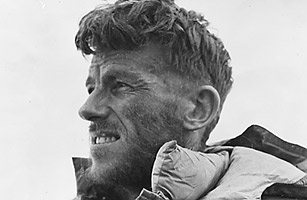
(5 of 7)
Before we came down off the mountain, Lowe met us on the South Col. He said, "How did it go?" And I said, "Well, George, we knocked the bastard off."
When you got down, everything got crazy quickly. The knighthood came through almost immediately.
I had nothing to do with that.
You didn't want it?
If I'd been given the choice, I wouldn't have had it, no.
Why is that?
Well, I didn't really think I was the right material for a knighthood, and it had never been something that I had any ambition to have. But I found in later years that if you're philosophical about it, it really can be quite useful in a way — useful for getting support for other activities. And then there was all that confusion about Tenzing getting on top first.
When we got back to Kathmandu Valley, we were met by communists — there was quite a strong communist movement on the mountain and in the villages. Now, I'm not anticommunist by any manner or means, but there was no question they felt that it was most important that they should stress that Tenzing had got to the summit first. Whereas to the ordinary mountaineer, of course, it's a matter of complete indifference. So they got Tenzing aside, and they really batted away at him, and I think they frightened him to death, quite frankly. And he, even though he couldn't at that stage read or write, signed a document that they presented to him, which indicated he had got to the top first. As he said afterwards, he had no idea what he was signing. It really was quite an uncomfortable time. In the end, Tenzing and I agreed that he did not get to the top first, and we agreed that we would say that we reached the summit together. That is basically what happened. Who actually set foot there first is a matter of complete indifference. But people still ask me the question.
Your life changed profoundly.
It was certainly the occasion that brought me to public notice. The media created a Hillary and Tenzing that really didn't exist. They made us into heroic figures, and it didn't really matter what we thought or said or did.
The main thing was that as long as I didn't believe all this rubbish that was written, I would be O.K. I never did believe it. And I think I've survived reasonably well. I never deny the fact that I think I did pretty well on Everest. On the other hand, never for a moment have I ever suggested that I was the heroic figure that the media and the public were making me out to be. The public really like heroic figures that they can look on with great admiration, and whether it's true or not doesn't seem terribly important.
Were you stunned by the reception?
No. George and I actually thought it was a bit of a scream. We all went to Britain and there was a tremendous reaction. I can remember walking across the street and a London taxi stopped and the taxi driver — he was a tough-looking cookie — came out and said, "You're Hillary, aren't you?" And I said, "Yeah." And he said, "Congratulations. You know, you've done a great job for us!" He got back in his cab and drove off. Now, the contrast was when we arrived back here in New Zealand. There was a big crowd — Mayor of Auckland and all the rest of it. I was put in this great big limousine to be driven off, and the window was down and a big hefty farmer-looking type thrust his hand in, grabbed me and shook me by the hand and said, "Good on you, Ed!" He said, "You did very well for yourself." Completely different. In England they thanked me for all we had done for Britain, but over here, in rather New Zealand fashion, they complimented me for having done well for myself. It never really let up.
How do you feel when you go down to the grocery store and pass a five-dollar note with your picture on it?
I don't spend a great deal of time thinking about that sort of thing.
You never stopped adventuring.
As far as I was concerned, the climb at Mount Everest really was a beginning rather than an end. It gave me the opportunity to do lots of interesting things.
You speedboated down the Ganges, you climbed Mount Herschel on Antarctica, you went on that three-year tractor expedition to the South Pole. What was the allure of Antarctica?
It was a very good challenge. Vivian Fuchs wanted to cross the Antarctic and carry out the task that [Ernest] Shackleton had tried. He invited me on the expedition, I think mainly because he felt that would enable him to get support from the government. It was a good challenge. And it was snow and ice, which I enjoy.